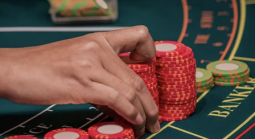Why Sports Betting Bills in California Are Doomed to Fail
-
Neither sports betting proposition is polling well just one week out from the midterms
-
Young voters are the most likely to support the initiatives but least likely to show up in a midterm election
Sports betting is on the ballot in California this coming Tuesday but most experts believe the two initiatives are doomed for failure. These are the questions appearing on the ballot Tuesday.
Proposition 26 ballot text: Authorizes New Types of Gambling. Initiative Constitutional and Statutory Amendment. Allows federally recognized Native American tribes to operate roulette, dice games, and sports wagering on tribal lands, subject to compacts negotiated by the Governor and ratified by the Legislature. Beginning in 2022, allows on-site sports wagering at only privately operated horse-racing tracks in four specified counties for persons 21 years or older. Imposes 10% tax on sports-wagering profits at horse-racing tracks; directs portion of revenues to enforcement and problem-gambling programs. Prohibits marketing of sports wagering to persons under 21. Authorizes private lawsuits to enforce other gambling laws.
Proposition 27 ballot text: Allows Online and Mobile Sports Wagering. Initiative Constitutional Amendment and Statute. Legalizes online and mobile sports wagering, which currently is prohibited, for persons 21 years and older. Such wagering may be offered only by federally recognized Indian tribes and eligible businesses that contract with them. Individuals placing bets must be in California and not located on Indian lands. Imposes 10% tax on sports-wagering revenues and licensing fees. Directs tax and licensing revenues first to regulatory costs, then remainder to: 85% to homelessness programs; 15% to nonparticipating tribes. Specifies licensing, regulatory, consumer-protection, and betting-integrity standards for sports wagering.
Dan Walters of the Associated Press points to the confusing ad efforts paid for by companies supporting the two campaigns. Gaming companies and tribes poured millions into the ineffective advertising campaigns. Walters reports that a state poll conducted by the Public Policy Institute of California found just 34% of likely voters favor Proposition 26. This is the initiative supported by a majority of the state's tribes.
DraftKings and FanDuel are pushing Prop 27. That one is seeing even less support according to that same state poll, 26%.
Walters notes that the poll shows the one constituency most likely to support sports wagering in California is young men. They happen to be the least likely to vote in midterm elections.
It also doesn't help matters that both the Democratic and Repbulican parties have come out against Proposition 27.
And the supposed rationale behind Proposition 27 just doesn't add up, according to Roger Salazar, a spokesperson for the No on 27 campaign.
"Proposition 27 is not about helping the homeless, it’s about 90% of the profits from online sports betting going to large out-of-state corporations as well as a deceptive attack on tribal sovereignty," Salazar tells NBC Los Angeles.
No to Proposition 26 fired back that the five wealthiest Southern California tribal casinos will hold nearly all of the power should this initiative be successful.
"Now they are pushing to guarantee themselves a virtual monopoly on all gaming in California by giving private lawyers the powers of the Attorney General to bury their licensed cardroom competitors with frivolous lawsuits," No to Prop 26 claims.
California is the big get for supporters of legalized sports betting. And these proponents are now looking beyond 2022.
"There's too much at stake for nobody to give it another shot," PlayCA Analyst David Danzis tells The Center Square. "It stands to reason that all parties involved still have a very significant interest in some sort of sports gambling market in California."
Danzis sees 2022 as a learning curb.
"The tribes and the online gaming operators I think learned a bit from this campaign," he added. "At the end of the day, the likelihood of them coming together at some point in the future with the tribes holding a little bit more leverage when they do meet at the bargaining table, that's likely to happen."
- Gilbert Horowitz, Gambling911.com















